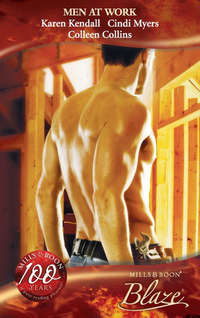
Полная версия
A Man to Rely On
He was about to excuse himself, to walk to McDonald’s and grab some lunch when the door opened and a woman entered. She was beautiful, with long dark curly hair, smooth, olive skin, a classic hourglass figure and an air of money and poise he associated with socialites from Dallas and Houston who spent weekends shopping in the “quaint” shops on the town square.
Jay rose to greet his visitor. “May I help you?”
“Mr. Redmond?” She flashed a dazzling smile. “I’m Marisol Luna.”
But of course they had both recognized her by then, the beautiful face less strained, the clothes less severe than they had been in countless pictures splashed across the front pages of newspapers and filling their television screens each night. The Lamar Dixon murder trial had all the elements of riveting drama: the celebrity victim, the beautiful accused, wealth, glamor, sexual affairs, gambling and unsavory secrets. People chose sides, wagered bets on Marisol’s guilt or innocence and read everything they could find about the case.
“Please sit down.” Jay gestured to the chair before his desk. “What can I do for you? Ms. Luna? You’ve gone back to your maiden name?”
“I thought it best.”
She sat, demurely crossing her legs at the ankles and smoothing her skirt down her thighs. Scott struggled not to stare at her.
“This is my son, Scott. You might remember him from school.”
Scott stepped forward to shake her hand, a brief silken touch gone too soon. He was sure Marisol did not remember him, though he had never forgotten her. His heart beat faster, remembering that day on the bridge. She wouldn’t have known him then, of course, but later, she had come to their house once. He’d been fourteen at the time, in awe of her sixteen-year-old beauty and her notoriety.
A notoriety she maintained years later, when the local papers were full of news of her marriage to basketball great Lamar Dixon. He’d seen Lamar on the basketball court once in Houston. Lamar had netted twenty-seven baskets in that game and hadn’t even broken a sweat. The papers had reported his last contract at seventeen million, making him one of the highest paid stars in the NBA.
And of course the murder charge and trial had only added to her reputation.
“I’m sorry about your husband’s passing,” Jay said. “And about everything you’ve been through.”
“Thank you.” She folded her hands in her lap. She looked very…contained. Behind the outward polish, Scott sensed she was shaken by more than grief.
“How have you been?” Jay asked.
“I’ve been fine.” Her voice was flat. Unemotional. The voice of someone concentrating on staying in control. Scott could feel the tension radiating from her, and she sat so rigidly he imagined she might shatter if touched.
Jay’s response was to relax even more, leaning back in the chair, hands casually clasped on the desktop. He’d once told Scott that the best way to handle fearful or nervous clients was to ease the tension with small talk. “It’s been a while since you’ve been back to Cedar Switch, hasn’t it?” he said. “I imagine it’s changed a lot since then.”
“It’s been a long time,” she said. “To tell you the truth, I’m more surprised by how much has remained the same.”
“Really?” Jay leaned forward. “Having lived here so long myself, it seems as if every other day some old building is being torn down and replaced by something new.”
She shifted in her chair. “I guess what I mean is that, for me at least, the town has the same feeling it always did.”
Scott and his father waited for her to elaborate on what that feeling might be, but when she did not, Scott wondered if she was waiting for him to leave. “I’ll let you two talk in private,” he said, moving toward the door.
“I don’t mind if you stay.” He felt a jolt when their eyes met, a shock of recognition that, even after all these years, this woman could stir him somewhere deep inside. He settled slowly into a chair a little ways from her and searched for something innocuous to say.
“Is your daughter with you?” Jay asked.
Scott vaguely recalled the mention in news reports of a teenage daughter.
“Yes. Antonia isn’t too happy about being here in ‘East Podunk’ as she insists on calling it.”
“I’ll bet she’s as pretty as her mother was at that age,” Jay said.
Scott could see the girl Marisol had been so clearly in his mind’s eye, exotically beautiful to a small-town boy like himself.
“Prettier, I hope. She’s tall, like her father.” Pride warmed her voice and softened her expression.
“You’re staying at your mother’s place?” Jay asked. “Your place now, of course.”
“Yes. I appreciate your handling transferring the title and everything after she died,” she said. “I obviously wasn’t in a position to come down and handle it myself.”
As Scott recalled, when Mercedes Luna had passed away, her only daughter had been confined to a cell in the Harris County Jail.
“I was happy to do it,” Jay said. “And it’s good to have you home.”
Marisol looked uncomfortable with the word, Scott thought. Then again, why would a woman like her, used to the finest things in life and the social whirl of a big city, ever feel at home in a small house in a sleepy place like Cedar Switch?
“I plan to stay here for a little while,” she said. “Until I can sell the house. That’s what I came to see you about. I was hoping you could recommend a real estate agent. I’d like to list the house as soon as possible. I didn’t know who else to ask.”
Jay’s smile broadened. “You came to the right place. Scott here is an excellent agent, and his office is right next door.”
She looked at Scott again, her gaze lingering, and he had the impression he was being judged. Sized up. “That’s very convenient,” she said. “Do you think you can sell my mother’s house?”
“I’ll be happy to help you find a buyer,” he said.
“Thank you.” She looked away from him again, her hands knotted tightly in her lap, gaze focused somewhere above his father’s desk. The silence went on so long he began to feel uneasy.
“Is there anything else I can help you with?” Jay asked.
She took a deep breath. “You’ve always been so kind to me,” she said.
“I’ve always liked you very much.” Jay’s voice was gentle. He cleared his throat. “We all do.”
Her eyes widened, as if in surprise, for half a second—such a fleeting expression Scott wasn’t entirely sure he’d actually seen it. The unnaturally calm mask was back in its place. “I have some questions I hope you can answer,” she said.
“I’ll do my best.” Jay relaxed in his chair again, while Scott continued to study the woman who sat a few feet away, unable to tear his eyes from her. The beauty he remembered had matured to something deeper, something more compelling even than the girl who had cast a spell over him.
“Why didn’t my mother want me at her funeral?” she asked, her accusing tone startling after the long silence.
“There wasn’t a funeral,” Jay said. “She insisted on that. I suppose, given the circumstances, she thought it best.”
Marisol laced her fingers together. “I had permission to come to town for a funeral,” she said. “My lawyers even thought it would help gain sympathy for me.”
When the media learned there was to be no funeral—that it had been her mother’s last wishes that Marisol not return to Cedar Switch—the press had trumpeted the news for weeks. Marisol was so bad, her own mother had rejected her. Of course a woman like that would murder her husband.
Jay frowned. “I didn’t know Mercedes well,” he said. “But I don’t think she even considered doing you any harm. I think she was simply a very private person who didn’t want any fuss over her. She wanted everything taken care of so you wouldn’t have to bother.”
“And she told you to wait until after she was buried before you contacted me?”
“Yes. I tried to talk her out of the idea. I told her you would want to be contacted. She made me promise not to bother you.”
“Was that the word she used? Bother? ”
He nodded. “Yes. She said it would be better for everyone if all the details were out of the way and over with before you even knew she was gone. I couldn’t convince her otherwise.”
Marisol’s shoulders sagged, and her fingers played with the strap of her purse, stroking the leather over and over. In that moment she seemed more vulnerable than she had since walking into the office. Scott fought the urge to put his arms around her. But the fact that he wanted so much to touch her kept him firmly in his chair. What he felt for the woman across from him went beyond sympathy for a client or compassion for an old friend. His feelings for Marisol were too mixed up with adolescent desire, unfulfilled fantasy and maybe even the fact that as an adult she was so much like the women who had attracted him during his high-flying days—polished, sophisticated women whose outer sleekness was a thin coating over an earthy sensuality. He couldn’t separate all these facets of his attraction to Marisol in his mind, and therefore had no business laying a finger on her.
She stood suddenly, poised once more. She extended her hand to Jay. “Thank you for talking with me.”
“If there’s anything I can do, don’t hesitate to ask.”
“Thank you.” She turned to Scott. “I’ll want to sell the house as soon as possible.”
“I can come out late today or tomorrow to look at it and draw up a listing agreement.”
“Tomorrow would be best, thank you.” She turned to leave. He stood and followed her, holding the door open for her. Then he moved to the window and watched her walk to a bright red Corvette that was parked at the curb. He smiled. He would have guessed the girl who stood naked on the bridge and the woman who held her head high and faced the television cameras head-on would drive a car like this. A car that dared everyone to watch her. As they always had.
As he always had.
CHAPTER TWO
M ARISOL WOKE the next morning to golden light streaming through the yellow curtains in her mother’s old bedroom. Lying there in a place she had never imagined she would find herself she felt the impotence of a person in a dream, unsure her legs would support her if she tried to rise. The grief she had fought for days battered at her, waves of memory threatening to drown her: her mother teaching her to make tortillas when Marisol was five years old, Mercedes’s larger hands over her small ones, helping her to pat out the flat disks of dough; mother and daughter watching the movie Grease at a matinee at the Cedar Switch cinema, sharing a tub of buttery popcorn and pretending to swoon over John Travolta; the pink silky dress she wore to her mother’s remarriage, and how much she’d cried when the newlyweds left her behind for their brief honeymoon.
Mercedes had told her she was gaining a father that day, but in truth Marisol had lost her mother to Harlan Davies. He had been a hard, possessive man, who had demanded Mercedes take his side in all disputes. Until finally he had dug a chasm between mother and daughter that could not be crossed, not even after his death.
If Marisol could have asked her mother one question now, it would be if she felt all she’d gained by marrying Davies had been worth all he had forced her to surrender.
She shut her eyes tightly and forced her mind from such thoughts. She had too much to do to indulge her grief. This morning she had to see about finding a job; the few thousand dollars left in her bank account after she’d paid the legal team and all their investigators, and settled the debts Lamar had left her with would not last long. And she absolutely would not touch Toni’s college fund. Lamar’s death had robbed his daughter of the advantages of wealth and privilege; Marisol would not deprive her of a first-class education as well.
Besides, working would keep Marisol occupied and out of the house until it sold and they could leave town for good.
What kind of job she had no idea. Years of attending charity balls, shopping and lunching with her friends had left her without any marketable skills. But she was smart. She could learn.
She’d spent the previous afternoon arguing with Toni, who had wanted to explore the town on her own. Marisol had refused to consider the idea, which had led to a shouting match, ending with Toni declaring, “I hate you!” and retreating to Marisol’s old room, where she’d plugged in her iPod and refused to budge, even to eat.
How many times had Marisol acted out a similar scene with her own mother? If anything, she had been more unruly than Toni, sneaking out of the house at all hours of the day and night, purposely doing things she knew would enrage Harlan. Only now, from the perspective of an adult and a parent herself, could she understand how much her rebelliousness must have also hurt her mother.
She forced herself out of bed, made coffee, then knocked on her daughter’s door. Toni had insisted on moving into Marisol’s bedroom. “Toni, are you up? I need to go out for a while.”
“I’m up.”
“There’s cereal and bread in the kitchen. Fix yourself something to eat.”
“I will.”
She would have liked to see her daughter’s face this morning, to have hugged her and to have drawn strength from the sight of her. The last thing Marisol wanted to do was to go out and beg for a job in a town she’d always hated—from people she’d always felt hated her. But for Toni, she would do it.
She went first to the courthouse. At one time, the county and the school district were the town’s largest employers. She wasn’t qualified to be a teacher, but surely she could handle work as a clerk in one of the county offices.
The woman behind the counter’s eyes widened when she saw Marisol. “You’re Lamar Dixon’s wife,” she said. “I mean widow.”
“I’m Marisol Luna. I’d like to apply for a job.”
The woman’s eyes narrowed. “Doing what?”
“Anything.” Marisol forced herself to meet the woman’s critical gaze. “What openings do you have?”
The woman shook her head emphatically. “You couldn’t work here.”
“Why not?”
“You can’t have a criminal record and work for the county government.”
Marisol stiffened. “I don’t have a criminal record,” she said. “I was acquitted. That means I was found not guilty.”
“I know what it means.” The woman’s lips were a thin, straight line in her stern face. “I don’t think anyone would want to hire you. It wouldn’t look good.”
Marisol ground her teeth together, battling the urge to tell this woman exactly what she thought of her. “May I fill out an application?” she asked evenly.
“Fill it out all you want.” The woman pulled a sheet of paper from a cubbyhole and sailed it across the counter, then turned away, muttering about people who “weren’t any better than they should be.”
Marisol fared little better at the other places she tried. The office supply owner asked why a woman “whose husband made all that money” would need to work.
Marisol chafed at explaining Lamar had gambled away most of his income, and she had spent the rest fighting for her life in court. “Trust me, I need the job,” she said instead. She didn’t mention she only planned to stay in town a few months at the most; no sense giving anyone another reason not to hire her.
“Can’t help you. I already got a high school girl who works part-time and that’s all I need.”
The librarian was more sympathetic. “I wish I could help you, I really do,” she said. “But the county cut our budget this year and we had to let one of our librarians go. We’re getting by with volunteers. But if you’d like to volunteer…”
The florist squinted at Marisol behind thick spectacles. “I know you,” he said.
Who doesn’t? she wanted to reply, but kept quiet and waited for him to say something about the trial. Instead, he startled her by saying, “You’re Marisol Luna. I knew you in high school.” His grin was more of a leer. “I remember when you jumped off the highway bridge. Stark naked.” He chuckled. “That was really something.”
She wanted to slap the grin right off his face, but, thinking of Toni, she repressed the impulse. “Do you have any job openings?” she asked.
He leaned across the counter toward her, his tone confiding. “I’d love to hire you, hon, but my wife would have a conniption if she thought the two of us were working together. So I’d better not. Though if you’d like to come back after I close up, maybe we could have a drink for old time’s sake.”
She moved on. Her feet hurt, and her mouth, neck and shoulders strained from holding her head high and smiling. Sweat pooled in the small of her back and she worried her anti-perspirant had given up. She was also hungry and had a pounding headache. She tried to distract herself by looking at her surroundings. As she’d told Toni, the whole town looked better than it had when she’d left, with new awnings, fresh paint and flowers around the square. She recalled seeing an article in the travel section of the Houston Chronicle last year, which had touted Cedar Switch as a popular destination for weekend getaways, with a newly revitalized downtown, an abundance of bed-and-breakfast inns and restaurants and shops that catered to tourists.
The whole square now looked like something out of a Norman Rockwell painting—except for the hulking brown building two blocks west of the courthouse. Once a masterpiece of Victorian architecture, with elaborate wedding-cake trim, soaring columns and a stained-glass cupola, the Palace Hotel had been the social center of town when Marisol was a girl. Countless senior proms, wedding receptions and formal balls had been held in the upstairs ballroom.
Now the paint was faded and flaking, the windows broken or boarded up. Overgrown rose vines spilled across the front steps, bright pink petals scattered down the walk, as if left over from a long-ago wedding reception. A red-and-white metal For Sale sign was planted near the sidewalk.
Marisol stared at the once-grand building with a knot in her throat. When she looked back on her life in Cedar Switch, almost all of the good times were associated with the Palace Hotel. Seeing it so neglected and rundown made her doubt the reliability of her memories. Maybe her recollections of the past were as flawed as her judgment about Lamar.
She turned away, and hurried back to the square, mentally reviewing her employment options. She was running out of places to look for work. The bank, hardware store and Cherie’s boutique had all turned her down, some more politely than others. Everyone had stared. Some had asked rude questions. No one had offered her a job, or any clue as to where she might find employment.
There was the grocery store out near the highway—though the thought of dragging dripping chickens and twelve packs of beer across the scanner made her recoil in revulsion. She stopped and studied the square for anything she might have missed. Her gaze rested on a white storefront in the middle of the block on the east side of the courthouse. The Bluebonnet Café.
There had been a café in that location when Marisol was a girl, though then it had been the Courthouse Café. Open for breakfast and lunch, it had done a good business, catering to downtown workers and shoppers and those who had dealings at the courthouse.
Restaurants almost always needed help, didn’t they? And no special skills were needed for waitressing beyond a good memory, a certain grace and the ability to chat up the customers. Countless charity balls and cocktail parties had trained her well in those talents.
She squared her shoulders and walked to the corner to cross the street. With her luck, she didn’t want to risk getting arrested for jaywalking. Even that would be enough to make her the top story in the evening news.
The café itself was a neat, white-painted room lined with red-leatherette booths, the center filled with small tables with blue-checked tablecloths and ladder-backed chairs.
“Can I help you?” an older woman with twin long gray braids, a white apron over overalls and T-shirt asked when Marisol stopped in the entrance.
“I’d like to apply for a job,” Marisol said.
The woman gave her a curious look, and Marisol braced herself for comments about the trial, or Lamar, or even her infamous past in Cedar Switch. Instead, the woman said, “You’re prettier than most we get in here. You ever waitressed before?”
Marisol shook her head. “But I’m very good with people.”
“Can you carry a tray full of blue plate specials, that’s the question.”
“Yes, I can. I’m sure I can.”
“All right.” The woman opened a drawer and pulled out a single sheet of paper. “Fill that out.”
Marisol completed the brief questionnaire, writing in the number and street of her mother’s old house in the space for address. Even after twenty years, she could recall it easily. Staring at the address on the paper, she felt a sense of disorientation—the same feeling she’d had each morning in jail when she’d first awakened, as if at any minute she’d discover she’d only been dreaming. Lamar wasn’t dead. She wasn’t accused of killing him. Everything was all right again.
The woman returned, took the paper and glanced at it. “The pay is five dollars an hour plus tips,” the woman said. “6:00 a.m. to 2:00 p.m. Can you start tomorrow?”
Marisol blinked. “You mean I’m hired?”
“If you want the job and you can do the work, yeah.”
“Yes. I mean, thank you. I’ll be here tomorrow.” She’d meant to spend tomorrow getting Toni enrolled in school, but there would be time to do that in the afternoon. Toni would have to get herself up and onto the school bus each day, but the responsibility would be good for her.
“Thank you,” Marisol said again, unable to keep back a smile. “Thank you.” Then she hurried away, before the woman could change her mind. She had a job. A real job. She looked around, wishing she had someone she could tell. Some friend.
But the women she’d thought of as friends—other players’ wives, women in her neighborhood and those with whom she’d served on the boards of various charities—had ceased to be friends the night Marisol was arrested. Not one of them had visited or written to her during her trial or in the long days leading up to it. She was no longer one of them.
That had been one more hurt, on top of losing her husband and learning the truth about all he’d done behind her back. One more thing to harden herself against. She straightened and walked toward her car. She’d celebrate tonight with Toni. As long as she had her daughter, she didn’t need friends.
S COTT PULLED HIS CAR to the curb and studied the modest white brick house with a critical eye. This sort of place wasn’t as attractive to buyers from Houston as the Victorians near the square, but given enough time he was sure he could find a buyer. He hoped Marisol wasn’t disappointed in the price he thought he could get; to a woman used to living in a River Oaks mansion, the going rate for small-town residences probably seemed like pocket change.
He shut off the engine and glanced at his reflection in his rearview mirror, wondering why he was bothering. Marisol Luna wasn’t going to be impressed by the likes of him. Besides, he had a girlfriend. Tiffany Ballieu, the blue-eyed blond sweetheart of his high school days, had sought him out last year, letting him know she was newly divorced and more than willing to pick up where they’d left off. Tiffany was sweet, respectable and exactly the sort of woman he needed in his life.
Carrying the folder with the comparables he’d pulled and a blank listing agreement, he made his way up the walk and rang the doorbell. He waited, and was about to ring a second time when the door creaked open a scant two inches and one bright brown eye studied him through the crack. “Hello?” said a soft female voice.
“I’m Scott Redmond,” he said. “Here to see Marisol Luna.”
“She doesn’t want to talk to any reporters.” The door started to close.
“I’m not a reporter,” Scott said. “I’m a real estate agent. She talked to me yesterday about selling this house.”











